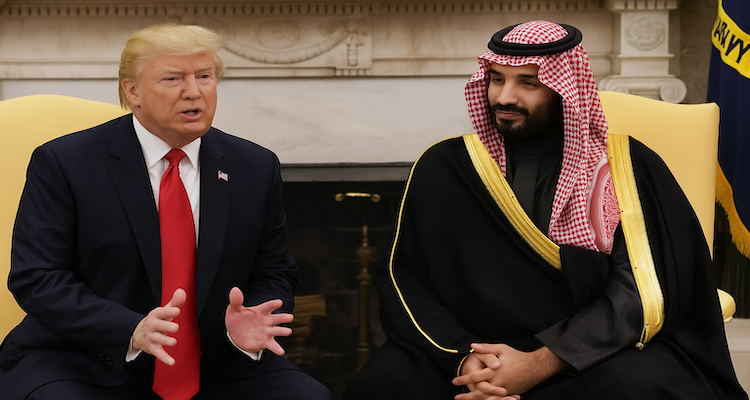Trump Defends Prince Salman Over Khashoggi Killing During High-Profile White House Visit

During Crown Prince Mohammed bin Salman’s first White House visit in seven years, Donald Trump defends him over Jamal Khashoggi’s killing, sparking renewed controversy.
A Familiar Controversy Returns to Center Stage
A high-stakes White House meeting meant to showcase strengthened U.S.-Saudi ties reignited one of the Middle East’s most contentious diplomatic crises. As Saudi Crown Prince Mohammed bin Salman arrived in Washington for his first presidential-level visit in more than seven years, U.S. President Donald Trump offered an emphatic defense of the prince’s role in the 2018 murder of journalist Jamal Khashoggi openly contradicting U.S. intelligence findings and igniting fresh debate at home and abroad.
The moment unfolded in the Oval Office, with cameras rolling and global attention fixed on Trump’s overt show of support for the crown prince.
A Killing That Shook Global Diplomacy
Jamal Khashoggi, an influential Washington Post columnist and outspoken critic of the Saudi leadership was murdered inside the Saudi consulate in Istanbul in October 2018. His killing triggered worldwide condemnation, intense scrutiny of Saudi intelligence operations, and demands for accountability from human rights advocates and Western governments.
U.S. intelligence agencies later assessed that Crown Prince Mohammed bin Salman approved the operation to capture or kill Khashoggi. The crown prince has consistently denied ordering the killing, while acknowledging responsibility for the broader climate that enabled it as the kingdom’s de facto leader.
The controversy had cooled in recent years, but Trump’s remarks revived it with full force.
Trump Rejects Intelligence Findings, Praises Mohammed bin Salman
Seated beside Mohammed bin Salman, Trump dismissed the U.S. intelligence assessment outright, insisting that the crown prince had no advance knowledge of the plot.
“Things happened, but he knew nothing about it, and we can leave it at that,” Trump told reporters, adding that “many people didn’t like” Khashoggi a remark that drew immediate national and international criticism.
The president also rebuked the journalist who raised the Khashoggi question, suggesting the inquiry was intended to “embarrass our guest.”
MBS, speaking calmly but firmly, described the murder as a “painful” episode for the kingdom.
He said his government took “all the right steps of investigation” and implemented reforms to prevent such an incident from happening again, calling the killing a “huge mistake.”
Trump went even further, praising the Saudi leader for doing an “incredible” job on human rights—though he did not specify what improvements he was referencing.
Outrage From Khashoggi’s Widow and Rights Groups
Trump’s extraordinary defense swiftly drew condemnation, including from Jamal Khashoggi’s widow, Hanan Elatr Khashoggi.
“Nothing can justify such a horrible crime… not because he was controversial, or disliked by someone,” she told Reuters, adding that she wished Trump would meet her to understand “the real Jamal.”
Human rights organizations also criticized the remarks, pointing to the prince’s broader crackdown on dissent, mass arrests of activists, and suppression of political expression in Saudi Arabia. At the same time, they noted that MBS has introduced sweeping social reforms from expanding women’s rights to reducing religious police powers part of his Vision 2030 initiative to modernize the kingdom.
Arms, Security Pacts, and Nuclear Negotiations
Despite the resurfaced controversy, the meeting underscored the strategic importance of U.S.-Saudi relations, particularly under Trump’s second term.
Arms Sales and Defense Agreements
The White House announced that Trump had approved future deliveries of F-35 fighter jets to Saudi Arabia, a landmark shift in U.S. policy, as Israel has long been the only Middle Eastern nation permitted to acquire the aircraft under Washington’s commitment to preserving Israel’s “qualitative military edge.”
Saudi Arabia, which has requested 48 F-35s, also agreed to buy 300 American-made tanks.
In addition, both nations signed a new Strategic Defense Agreement intended to strengthen deterrence across the Middle East. While details remain sparse, the pact falls short of the NATO-style treaty Riyadh had sought.
Civil Nuclear Energy Cooperation
A joint declaration marked the completion of negotiations over a civil nuclear energy framework, laying the groundwork for long-term U.S.-Saudi collaboration on atomic power.
Riyadh has sought access to U.S. nuclear technology to keep pace with regional competitors like Iran and the UAE. But Washington has hesitated because Saudi Arabia refuses to adopt conditions that would prohibit uranium enrichment or fuel reprocessing, processes with potential weapons implications.
Trump acknowledged the challenge, saying a civilian nuclear deal was possible but “not urgent.”
Prince Salman Boosts Investment Promise
Trump welcomed the crown prince with full ceremonial honors, including a military band, cannon salute, and jet flyover, underscoring the White House’s desire to highlight the strength of the bilateral partnership.
During their meeting, Mohammed bin Salman pledged to expand Saudi investment in the United States from a previously announced $600 billion to $1 trillion. He offered no specifics or timeline. Analysts note that such a massive investment could be difficult to execute given Saudi Arabia’s heavy spending on domestic megaprojects, including futuristic cities now facing major cost overruns.
The two leaders also signed agreements on artificial intelligence cooperation and critical minerals development, areas the U.S. considers key to future global competitiveness.
As MBS prepares to promote Vision 2030 at a high-profile investor conference at the John F. Kennedy Center, he is expected to court major U.S. business executives eager to deepen ties with the Gulf’s most influential economy.
Questions About Trump’s Business Ties
Facing questions about his family’s business interests in Saudi Arabia, Trump insisted he had fully separated from the Trump Organization upon entering office.
“I have nothing to do with the family business… What my family does is fine. They do business all over,” he said.
Though the company is run by his children, Trump remains the beneficiary of the trust that controls the organization, meaning he could access revenue from Saudi ventures once he leaves office.
A Reset With Global Consequences
Trump’s public absolution of Mohammed bin Salman signals a major deepening of U.S.-Saudi cooperation, militarily, economically, and diplomatically. But it also risks alienating human rights advocates, critics of Saudi governance, and members of Congress who have long pushed for accountability in the Khashoggi case.
The approval of F-35 sales could alter the regional military balance, while the nuclear framework may shape Middle Eastern energy and security architecture for decades.
For Saudi Arabia, the visit marks a symbolic rehabilitation of the crown prince’s global image, something MBS has aggressively sought since 2018.
For Washington, it cements a partnership that could influence U.S. policy from energy markets to Middle Eastern diplomacy for years to come.
A Relationship Strengthened, a Debate Reopened
Trump’s high-profile embrace of Mohammed bin Salman highlights both the durability and complexity of U.S.-Saudi relations. While the two leaders celebrate new defense, economic, and nuclear agreements, the specter of Jamal Khashoggi’s killing continues to shadow Riyadh’s place on the world stage.
The White House meeting may have been designed to project unity and strategic alignment, but it also reopened wounds the global community has not forgotten, and raised new questions about U.S. foreign policy priorities in an era of shifting geopolitical power.
ALSO READ: India and UK Kick Off ‘Ajeya Warrior-25’ Military Exercise in Rajasthan’s Desert Terrain










